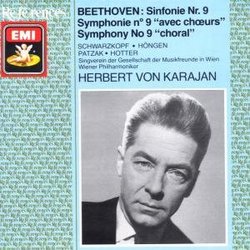| All Artists: Ludwig van Beethoven, Herbert von Karajan, Elisabeth Höngen, Vienna Philharmonic Orchestra, Elisabeth Schwarzkopf, Julius Patzak Title: Beethoven: Symphony No. 9 "Choral" Members Wishing: 0 Total Copies: 0 Label: EMI Classics Imports Original Release Date: 1/1/1947 Re-Release Date: 4/3/2001 Genre: Classical Styles: Historical Periods, Classical (c.1770-1830), Modern, 20th, & 21st Century, Symphonies Number of Discs: 1 SwapaCD Credits: 1 UPC: 077776107622 |
Search - Ludwig van Beethoven, Herbert von Karajan, Elisabeth Höngen :: Beethoven: Symphony No. 9 "Choral"
 | Ludwig van Beethoven, Herbert von Karajan, Elisabeth Höngen Beethoven: Symphony No. 9 "Choral" Genre: Classical
|
Larger Image |
CD Details |
CD ReviewsThe first great Ninth of the postwar era Santa Fe Listener | Santa Fe, NM USA | 10/05/2005 (5 out of 5 stars) "In 1946 Vienna was a demolished wreck, the city was divided into sectors ruled by the various Allies, and economic hardship prevailed everywhere. Into this dire situaiton walked Walter Legge, the pre-eminent record producer in the world. He traveled thanks to a military pass offered by a generous American officer he chanced to meet in a bar.
Legge found the young Karajan living with several others in a two-room apartment. Soul mates from the first, they immediately began to work out the musical future of EMI, Legge's parent company, and in essence much of postwar Europe, given that Karajan would come to dominate orchestral (and later, opera) life in London with the Philharmonia, later on in Berlin, Vienna, Salzburg, and Paris with other great ensembles. This 1947 performance of the Beethoven Ninth, in excellent mono sound for that era, is one of the two great recordings Karajan made with Legge at the very outset--the other is a Brahms German Requiem from that same year, unsurpassed to this day for intensity and spiritual fervor. This Ninth is the most propulsive and committed of Karajan's five recorded documents; it is closest in spirit to his streamlined Ninth with the Philharmonia he made a decade later. But here, despite the dated sonics--which really ae quite listenable--we have a great bass soloist in Hans Hotter, leading an excellent vocal quartet composed of the best singers in Vienna: Elisabeth Schwarzkopf, Elisabeth Hongen, and Julius Patzak. In 1951 Bayreuth would reopen, and Legge would record a legendary live performance of the Ninth under Furtwangler, which is weightier, more overtly spiritual, and in considerably worse sound, not to mention being deficient in many rechnical respects. Most people assume that postwar Ninths began there, but in fact they began with this equally valid and much better recorded Ninth from Vienna." |

 Track Listings (11) - Disc #1
Track Listings (11) - Disc #1